|
|
|
Sort Order |
|
|
|
Items / Page
|
|
|
|
|
|
|
| Srl | Item |
| 1 |
ID:
102837
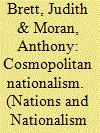

|
|
|
|
|
| Publication |
2011.
|
| Summary/Abstract |
This article challenges the theoretical opposition between nationalism and cosmopolitanism with empirical research on the ways in which a group of ordinary Australians talked about multiculturalism in the 1980s and again in the 2000s. It shifts attention from identity work to the understanding of day-to-day social relations: it finds that they are strongly nationalist and yet also display a cosmopolitan embrace of the benefits of cultural diversity. They draw on the inclusionary resources of Australian nationalism and its history to strengthen their cosmopolitanism and calm their anxieties about living with diversity. Their commonsense conceptualising of Australia's contemporary multicultural society in terms of a mix of individuals rather than an ensemble of groups is crucial to understanding why cultural diversity has been embraced within the framework of the nation.
|
|
|
|
|
|
|
|
|
|
|
|
|
|
|
|
| 2 |
ID:
102832
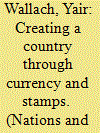

|
|
|
|
|
| Publication |
2011.
|
| Summary/Abstract |
Recent studies have examined the use of currency and stamps for nation-building in various contexts, with these artefacts seen as vehicles for indoctrination and gaining legitimacy by ruling elites - as a form of "banal nationalism". This article goes further to argue that in moments of geopolitical upheaval, these symbolic artefacts can play a crucial role in shaping the very framework of nationhood. This article focuses on the Middle East during World War I and its aftermath, and on British efforts to shape public opinion through the issuing of Palestine postage stamps and currency (1920-7), which were intended to convey Britain's commitment to Zionism. Parallels are drawn to the introduction of Arab stamps and flags during the Arab Revolt (1916-18). The benefit to Zionist nation-building and "Hebrew Revival" is discussed, as well as the strikingly different reactions of local constituencies - Arabs and Jews - to the political message of these symbolic objects.
|
|
|
|
|
|
|
|
|
|
|
|
|
|
|
|
| 3 |
ID:
102823


|
|
|
|
|
| Publication |
2011.
|
| Summary/Abstract |
Today, a new breed of charismatic and media-savvy religious figures are reinvigorating internal debates on Islam by drawing large audiences across the Muslim world and the Muslim diaspora in the West. Using satellite media, websites, blogs and video blogs, these new religious celebrities are changing the nature of debate in Islam from a doctrinaire discourse to a practical discussion that focuses on individual enterprise as a spiritual quest. These leaders have become religious entrepreneurs, with sophisticated networks of message distribution and media presence. From Amr Khaled and Moez Masood, two leading figures of Arab Islamic entertainment television, to Baba Ali, a famous Muslim video blogger from California, Islam has never been more marketable. Satellite television and the internet are becoming fertile discursive spaces where not only religious meanings are reconfigured but also new Islamic experiences are mediated transnationally. This delocalisation of Islamic authority beyond the traditional sources of Egypt and Saudi Arabia is generating new producers and locales of religious meaning in Dubai, London, Paris and Los Angeles. This article examines the impact of celebrity religious figures and their new media technologies on the relativisation of authority in Islam and the emergence of a cosmopolitan transnational audience of Muslims. I ask if this transnational and seemingly apolitical effort is generating a new form of religious nationalism that devalues the importance of national loyalties.
|
|
|
|
|
|
|
|
|
|
|
|
|
|
|
|
| 4 |
ID:
102833


|
|
|
|
|
| Publication |
2011.
|
| Summary/Abstract |
This article examines the proliferation of communities that self-identify as indigenous peoples by looking at the Ogiek, Sengwer, Endorois and Pokot of western Kenya. It shows how community leaders have self-consciously employed a global discourse of indigeneity - and associated ideas of territorial association, marginalisation and especial vulnerability - to strengthen moral and legal claims to land and resources, to access new domains of action and cultivate new channels of patronage. The analysis also highlights how this process, together with similar developments across Africa, Asia and the Middle East, has prompted a re-evaluation and stretching of this global signifier at the supra-state level. Finally, the article reveals how the emergence of a new global space has provided new opportunities and strong incentives to renegotiate local "nationalisms" in a struggle for ownership and control of communal terroir, while factionalism has fed into, supported and fundamentally altered supra-national definitions.
|
|
|
|
|
|
|
|
|
|
|
|
|
|
|
|
| 5 |
ID:
102835


|
|
|
|
|
| Publication |
2011.
|
| Summary/Abstract |
This article examines the transformations in the cultural sphere of Tijuana, one of Mexico's largest and fastest growing cities, in order to emphasise the border as a crucial site of nation-building in northern Mexico. I propose that cultural and intellectual actors, through particular sites, are changing the way the city is positioned in relation to the national political space of Mexico. Two institutions are considered specifically, both of which are integral to the propagation of an array of representations of Tijuana. In looking to articulations of nationhood and practices of knowledge production, this article delineates how urban identities reclaim and reconfigure key aspects of national identity in a region heretofore unrecognised as central to the creation of a national imaginary.
|
|
|
|
|
|
|
|
|
|
|
|
|
|
|
|
| 6 |
ID:
102827
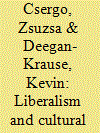

|
|
|
|
|
| Publication |
2011.
|
| Summary/Abstract |
This article relies on cases from new EU member states in postcommunist Europe to integrate two overlapping debates about majority-minority relations. Since the Second World War, political theorists and international institutions have tended to discourage group-rights approaches in favour of individual rights; meanwhile, policy-makers who achieved interethnic peace in postcommunist Europe have often opted for group-rights approaches. On the basis of political theory, international norms and the conduct of political elites in this region, we argue that both the individual-rights and group-rights approaches can be differentiated internally along the dimension of pluralism - that is, their willingness to accommodate multiple processes of cultural reproduction. Moreover, both group-rights and individual-rights approaches can offer justifications for restricting minority cultural opportunities; furthermore, restrictive group-rights approaches sometimes cloak their efforts behind 'Western-sounding' individual-rights rhetoric. Likewise, both group-rights and individual-rights approaches can permit group accommodation that can lead to political integration. We find that de facto pluralist approaches to minority accommodation - often spearheaded by moderate parties of the majority in coalition with minority-group parties - encourage ethnic peace, regardless of their foundation in individual or group rights.
|
|
|
|
|
|
|
|
|
|
|
|
|
|
|
|
| 7 |
ID:
102825


|
|
|
|
|
| Publication |
2011.
|
| Summary/Abstract |
This article explores the different scalar dimensions of Berber masquerades in southeastern Morocco. By ritually performing Jewish characters and demonstrating philo-Semitic nostalgia for a former Jewish presence, Berber (Amazigh) activists simultaneously engage different audiences at a local, national and transnational scale. In the first place, they assert themselves as moderate (even secular) Muslims for a transnational audience for whom Muslims' supposed anti-Semitism has been a mode of excluding them from modernity. At the same time, their performances underline the specificity of Berber culture as part of a national folkloric archive, welcome to a Moroccan national state interested in forging an authentic, national Islamic practice distinct from pan-Islamic Wahhabism. Thirdly, in allying themselves with Jews, Berber activists distance themselves from a variety of rivals to local political and economic dominance, particularly black "Haratin" whose demographic and economic strength in the southeastern oases has increased since Moroccan independence. In exploring the confluences and contradictions between these different scales of activism, this article points to the internal fractures within social movements organised around religion or ethnicity.
|
|
|
|
|
|
|
|
|
|
|
|
|
|
|
|
| 8 |
ID:
102824
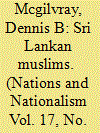

|
|
|
|
|
| Publication |
2011.
|
| Summary/Abstract |
Sri Lanka's Sunni Muslims or "Moors", who make up eight percent of the population, are the country's third largest ethnic group, after the Buddhist Sinhalese (seventy-four per cent) and the Hindu Tamils (eighteen per cent). Although the armed LTTE (Tamil Tiger) rebel movement was defeated militarily by government forces in May 2009, the island's Muslims still face the long-standing external threats of ethno-linguistic Tamil nationalism and pro-Sinhala Buddhist government land and resettlement policies. In addition, during the past decade a sharp internal conflict has arisen within the Sri Lankan Muslim community between locally popular Sufi sheiks and the followers of hostile Islamic reformist movements energised by ideas and resources from the global ummah, or world community of Muslims. This simultaneous combination of "external" ethno-nationalist rivalries and "internal" Islamic doctrinal conflict has placed Sri Lanka's Muslims in a double bind: how to defend against Tamil and Sinhalese ethnic hegemonies while not appearing to embrace an Islamist or jihadist agenda. This article first traces the historical development of Sri Lankan Muslim identity in the context of twentieth-century Sri Lankan nationalism and the south Indian Dravidian movement, then examines the recent anti-Sufi violence that threatens to divide the Sri Lankan Muslim community today.
|
|
|
|
|
|
|
|
|
|
|
|
|
|
|
|
| 9 |
ID:
102830
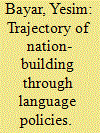

|
|
|
|
|
| Publication |
2011.
|
| Summary/Abstract |
This article explores the link between language policies and nation-building by focusing on the Turkish case during the early Republican period (1920-38). As opposed to conceptualising nation builders as seamlessly and strategically forming a nation out of the remnants of an empire, this article emphasises the complex and, at times, ambiguous nature of the nation-building process using Turkey as a case study. The article is also critical of ethno-symbolic accounts of nations and nation formation that tend to emphasise the cultural at the expense of the political sphere. Instead, by looking at the process and content of the formulation of language policies, this study demonstrates how culture was highly politicised during the formative period of the Turkish nation.
|
|
|
|
|
|
|
|
|
|
|
|
|
|
|
|
| 10 |
ID:
102821


|
|
|
| 11 |
ID:
102822
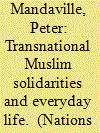

|
|
|
|
|
| Publication |
2011.
|
| Summary/Abstract |
Discussions of globalisation and identity have focused on the renewed relevance of various post-national frameworks of belonging, including the Muslim umma. This article argues against the idea that the umma has come to constitute a primary referent in contemporary Muslim debates about identity or a form of globalised political consciousness. Furthermore, the advent of 'post-Islamism' means that Islamic political mobilisation rarely seeks to establish alternative political orders within the container of the nation-state. However, this does not mean that we are seeing a reaffirmation of the nation in Muslim contexts today. Rather, transnational Muslim solidarities represent an intermediate space of affiliation and socio-political mobilisation that exists alongside and in an ambivalent relationship with the nation-state. I point to two different socio-religious movements that, without positing the primacy or exclusivity of the umma/Islamic identity, express discrepant visions of the relationship between Islam and the nation: (1) the Fethullah Gülen movement, which serves simultaneously as the vehicle for a particular vision of neo-Ottoman Turkish nationalism and a critique of the Kemalist national order; and (2) the neo-Salafist movement, read here as an effort to embed conceptions of public morality and accountability within the discursive tradition of orthodox Islam rather than the institutional framework of modern polity.
|
|
|
|
|
|
|
|
|
|
|
|
|
|
|
|
|
|
|
|
|